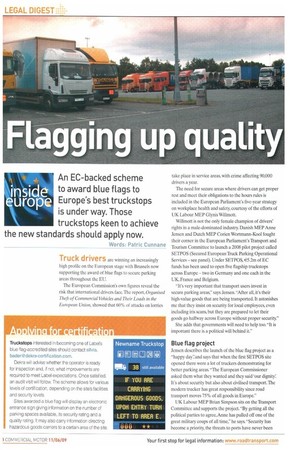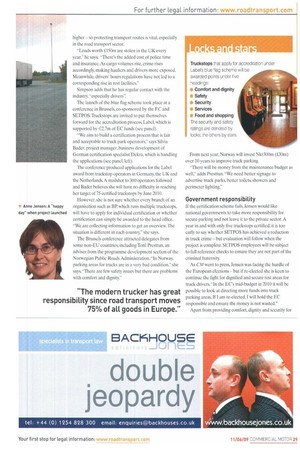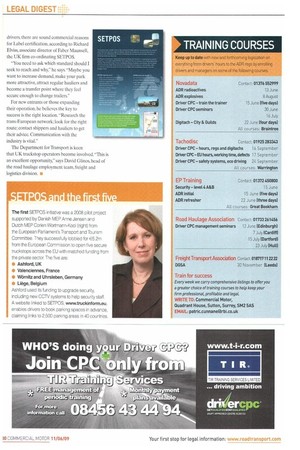An EC-backed scheme to award blue flags to Europe's best
Page 28

Page 29

Page 30

If you've noticed an error in this article please click here to report it so we can fix it.
truckstops is underway. Those truckstops keen to achieve the new standards should apply now.
inside europe
Words: Patric Cunnane Truck drivers are winning an increasingly high profile on the European stage with Brussels now supporting the award of blue flags to secure parking areas throughout the EU.
The European Commission's own figures reveal the risk that international drivers face.The report, Organised Theft of Commercial Vehicles and Their Loads in the European Union, showed that 60% of attacks on lorries take place in service areas, with crime affecting 90,000 drivers a year.
The need for secure areas where drivers can get proper rest and meet their obligations to the hours rules is included in the European Parliament's five-year strategy on workplace health and safety, courtesy of the efforts of UK Labour MEP Glynis Wiltmott.
Willmott is not the only female champion of drivers' rights in a male-dominated industry. Danish MEP Anne Jensen and Dutch MEP Corien Wortrnann-Kool fought their corner in the European Parliament's Transport and Tourism Committee to launch a 2008 pilot project called SETPOS (Secured European Truck Parking Operational Services — see panel). Under SETPOS, €5.2m of EC funds has been used to open five flagship truckstops across Europe — two in Germany and one each in the UK, France and Belgium.
"It's very important that transport users invest in secure parking areas," says Jensen. "After all, it's their high-value goods that are being transported. It astonishes me that they insist on security for local employees, even including iris scans, but they are prepared to let their goods go halfway across Europe without proper security."
She adds that governments will need to help too. "It is important there is a political will behind it."
Blue flag project
Jensen describes the launch of the blue flag project as a "happy day7and says that when the first SETPOS site opened there were a lot of truckers demonstrating for better parking areas. "The European Commissioner asked them what they wanted and they said 'our dignity: It's about security but also about civilised transport. The modern trucker has great responsibility since road transport moves 75% of all goods in Europe."
UK Labour MEP Brian Simpson sits on the Transport Committee and supports the project. "By getting all the political parties to agree, Anne has pulled off one of the great military coups of all time," he says. "Security has become a priority, the threats to ports have never been higher so protecting transport routes is vital, especially in the road transport sector.
"Loads worth £150na are stolen in the UK every year," he says. "There's the added cost of police time and insurance. As cargo volumes rise, crime rises accordingly, making hauliers and drivers more exposed. Meanwhile, drivers' hours regulations have not led to a corresponding rise in rest facilities."
Simpson adds that he has regular contact with the industry, "especially drivers".
The launch of the blue flag scheme took place at a conference in Brussels, co-sponsored by the EC and SETPOS. Truckstops are invited to put themselves forward for the accreditation process, Label, which is supported by €2.7m of EC funds (see panel).
"We aim to build a certification process that is fair and acceptable to truck park operators," says Silvia Bader, project manager, business development of German certification specialist Dekra, which is handling the applications (see panel, left).
The conference produced applications for the Label award from truckstop operators in Germany the UK and the Netherlands. A mailshot to 300 operators followed and Bader believes she will have no difficulty in reaching her target of 75 certified truckstops by June 2010.
However, she is not sure whether every branch of an organisation such as BP. which runs multiple truckstops, will have to apply for individual certification or whether certification can simply be awarded to the head office. "We are collecting information to get an overview. The situation is different in each country," she says.
The Brussels conference attracted delegates from some non-EU countries, including Toni Presttun, an adviser from the programme development section of the Norwegian Public Roads Administration. -In Norway, parking areas for trucks are in a very had condition," she says. "There are few safety issues but there are problems with comfort and dignity."
From next year. Norway will invest Nkr300m (1.30m) over 10 years to improve truck parking.
"There will be money from the maintenance budget as well," adds Presttun. "We need better signage to advertise truck parks, better toilets, showers and perimeter lighting."
Government responsibility
It the certification scheme fails. Jensen would like national governments to take more responsibility for secure parking and not leave it to the private sector. A year in and with only five truckstops certified, it is too early to say whether SETPOS has achieved a reduction in truck crime but evaluation will follow when the project is complete. SETPOS employees will be subject to full reference checks to ensure they are not part of the criminal fraternity.
As CH went to press, Jensen was facing the hurdle of the European elections but if re-elected she is keen to continue the light for dignified and secure rest areas for truck drivers. "In the EC's mid-budget in 2010 it will be possible to look at directing more funds into truck parking areas. If I am re-elected, I will hold the EC responsible and ensure the money is not wasted."
Apart from providing comfort, dignity and security for drivers, there are sound commercial reasons for Label certification, according to Richard Elviss, associate director of Faber Maunsell, the UK firm co-ordinating SETPOS.
"You need to ask which standard should I seek to reach and why," he says. "Maybe you want to increase demand, make your park more attractive, attract regular hauliers and become a transfer point where they feel secure enough to change trailers."
For new entrants or those expanding their operation, he believes the key to success is the right location. "Research the trans-European network; look for the right route; contact shippers and hauliers to get their advice. Communication with the industry is vital."
The Department for Transport is keen that UK truckstop operators become involved. "This is an excellent opportunity," says David Glinos, head of the road haulage employment team, freight and logistics division. •
















































































































































